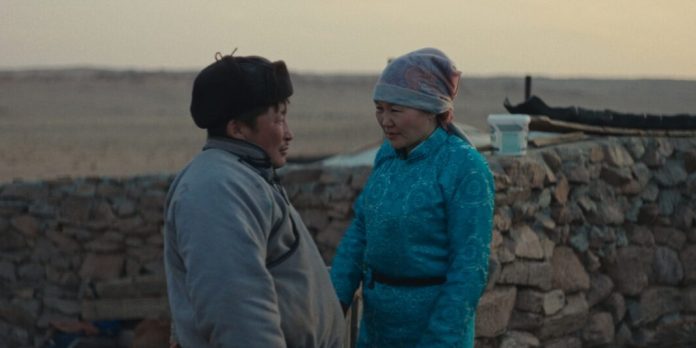THE STORY – A young couple living on a farm in rural Mongolia is forced to move to the city and adapt to an unconventional life after a storm ravages their village.
THE CAST – Davaasuren Dagvasuren & Otgonzaya Dashzeveg
THE TEAM – Gabrielle Brady (Director/Writer), Davaasuren Dagvasuren & Otgonzaya Dashzeveg (Writers)
THE RUNNING TIME – 95 Minutes
In Gabrielle Brady’s poignant film, “The Wolves Always Come at Night,” the lives of a Mongolian herding couple and their children change within a split second. A sandstorm forces Daava (Davaasuren Dagvasuren as himself) and Zaya (Otgonzaya Dashzeveg as herself) to migrate from the Gobi Desert countryside to Ulaanbaatar, the capital of Mongolia. Displaced from their land and distanced from their culture, Daava and Zaya are in a twilight zone between identity and belonging. As vulnerable newcomers to the city, Daava and Zaya now sit in reflection on the place they once called home. They yearn for the land and the animals that they’d made such a deep connection to. Recurring images of horses running through rural and urban environments spark a compelling conversation about the meaning of home. Told through a stunning hybrid of fiction and documentary, Brady’s empathetic approach gives space to Daava and Zaya’s memories, letting their truths guide the narrative.
Co-written by Brady, Dagvasuren, and Dashzeveg, “The Wolves Always Come at Night” centres on an authentic perspective on a Mongolian way of life. It’s this collaborative structure that gives the film incredible transparency, allowing participants to engage with an inherently intricate form of storytelling. And it’s Brady’s observational direction that captures a spectre of stories deep within the landscape. At countryside community meetings, we hear concerns about the impending threat of desertification. Through a devastating sandstorm and heartbreaking loss of animals, we see the impact of climate change on the region, along with the disappearing identities and livelihoods of herders. Through a family’s move to the city, we are given insight into an entire community of fellow herders who lost their way of life and had no elders in the countryside left to return to. One older couple was deprived of their animals due to a winter catastrophe in 2002. Tapping into subjects from urban migration and displacement to a worsening climate, Brady helps shape our understanding of Mongolian herders’ collective experiences.
One of the film’s most powerful lines of dialogue — “Whoever holds the torch tells a story” — comes at the beginning. It’s a line that flows into Daava and Zaya’s family as they tell each other stories. There’s an emphasis on a Mongolian legend about a lost group of travellers who enter a ger (a nomadic dwelling) in the Gobi landscape. The woman in the ger offers each traveller a cup of tea; all but one drink the tea, and all but one mysteriously die. The moral of the story is never go into a lone ger when you’re in a wasteland. This legend reverberates poignantly as a symbol of the herding community, faced with a bleak reality beyond their control. And it’s a striking reminder of the significance of holding onto one’s true identity and culture, refusing to accept a false way of life.
While yearning for home, Daava has lost belief in his abilities. He struggles to continue calling himself a herder — who is he without his animals? Brady’s direction excels at capturing stunning moments of interior conflict and reflection; Daava’s profound connection to the land weighs upon his identity and evokes his senses. He can still smell his horse’s sweat. He can still hear the land’s whispers, and “the winds with their beautiful sounds have the smell of home.” Stellar writing conveys just how poetic Daava and his family’s relationship is to the earth and its blessings.
Brady mirrors this deep respect for the environment in several ways, from slow-moving shots to frenetic movements, conveying how Mother Nature can be poetic one moment and violent the next. Brady also makes a point of including the animals’ perspectives, specifically the stallions that survived the sandstorm. They, too, are active participants in this film, observing humanity as they look for a new home. And they move like phantoms, as seen in a haunting sequence of Daava’s horses on country roads, led by the new herder he had sold them to.
The film beautifully replicates the feeling of Daava and Zaya reliving their memories as they return to the place they once called home. Brady’s gentle direction encompasses the vast beauty of the Gobi landscape. She builds on the film’s narrative by essentially going with the flow, letting the details of a given moment carry us onto the next in a seamless transition. The film’s craft also flows with the landscape. Michael Latham’s cinematography is a gorgeous balance between controlled techniques and an uncontrollable natural environment; the sandstorm has a visceral combination of both. Aaron Cupples’s score adds a wistful, eerie energy and recurring dread to the family’s transition from countryside to city. The film conjures lingering images and sounds that perfectly suit how Daava and Zaya’s land calls back to them on a spiritual level.
“The Wolves Always Come at Night” is a masterful achievement so attuned to nature on every level, from the visual language to the quiet narrative buildup. In this story of Mongolian herders, Brady vividly conveys the community’s deep connection to the earth, as well as the emotional turmoil when that connection is lost. It’s a moving, meditative story about pinpointing the feeling of home, and what it means to truly live somewhere. The collaborations with Daava and Zaya add immeasurable realism, as they transcend a standard documentary structure to create something far more intimate.


